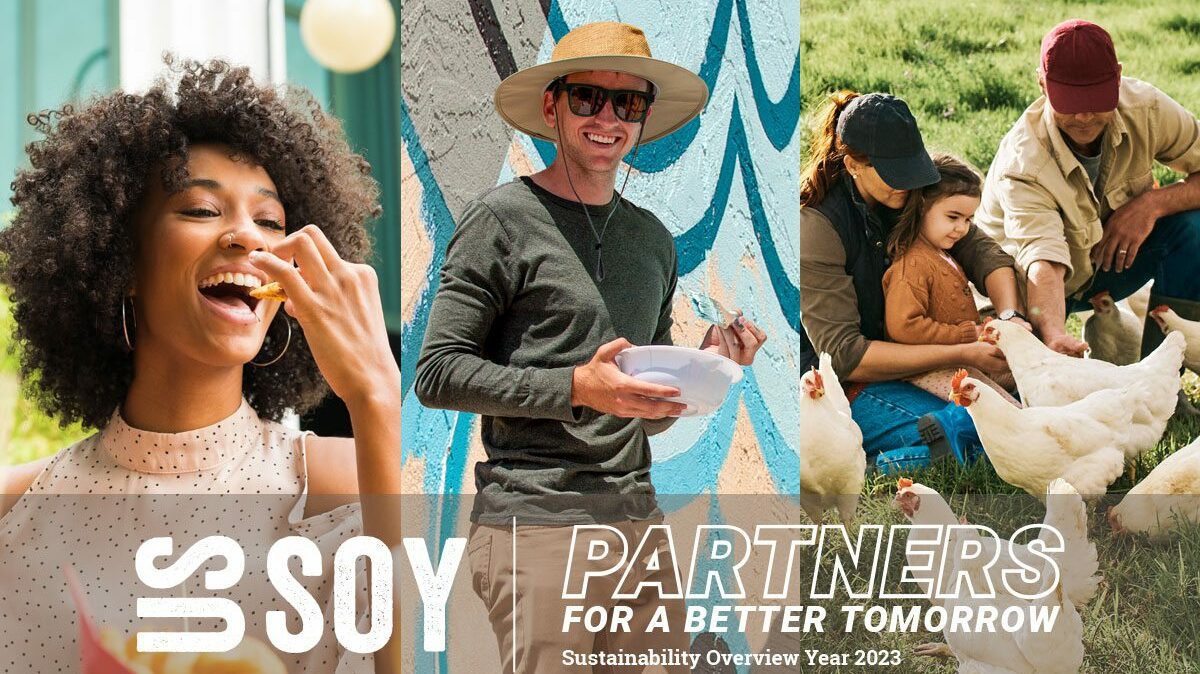New Report Highlights the Partnerships that Power U.S. Soy’s Growing Role as a Sustainable Source for Food, Feed, Fuel and Thousands of Other Products
ST. LOUIS (JANUARY 17, 2024) – What’s the power of one unassuming soybean? When it’s sustainably grown by U.S. Soy farmers and adopted by their growing roster of public and private partners, that single bean can simultaneously advance food security, renewable energy and environmental stewardship through an ever-expanding range of products people depend on every day.
On behalf of U.S. soybean farmers, United Soybean Board (USB) today released its 2023 U.S. Soy Sustainability Overview . Titled “Partners for a Better Tomorrow,” the report shines a spotlight on the partnerships fostered by these farmers’ checkoff investments to drive innovation both on and off the farm. These advances include efforts to enhance sustainability in production agriculture as well as ongoing development of new soy-based products that provide cleaner alternatives for everything from rubbers and plastics to adhesives and lubricants.
“U.S. Soy farmers are proud of the important and growing role they play in maximizing sustainability not only in farming but throughout industries and around the globe,” said Iowa farmer April Hemmes, who serves as chair of the Demand Action Team at USB. “We work with partners every day to discover new ways to use U.S. Soy to sustainably solve some of society’s biggest challenges. At the same time, these efforts support the U.S. economy by opening important new markets for the soy industry.”
Building Sustainable Food Security
The report highlights the efforts of U.S. soybean farmers and their partners to advance sustainable food production and support food security around the world. This starts on the farm, where modern practices and advanced technologies help farmers to conserve land, water, energy and other natural resources. Partners like Farmers for Soy Health and The Nature Conservancy work with U.S. Soy to expand the use of sustainable farming practices, such as cover crops and conservation tillage, which help to improve soil health and reduce greenhouse gas emissions.
U.S. farmers also support initiatives like U.S. Soybean Export Council (USSEC)’s Soy Excellence Centers and the World Initiative for Soy in Human Health (WISHH) aquaculture internship program. These programs provide protein producers in developing countries around the world with training and capacity-building programs to help them enhance productivity and sustainability.
Renewable Alternatives for Fossil Fuels and Other Products
The U.S. Soy Sustainability Overview also puts a spotlight on the growing range of renewable soy-based products available or in development today. Biodiesel is perhaps the best-known non-food use for U.S. Soy, as the renewable fuel can reduce total greenhouse gas emissions by up to 86% compared with petroleum diesel. Biodiesel is the first and only fuel commercially available nationwide to meet the U.S. Environmental Protection Agency’s definition of an advanced biofuel. U.S. Soy farmers’ checkoff investments helped to launch this fast-growing market and will continue to support its development in the years to come.
U.S. Soy also provides a renewable and safer alternative to fossil fuels and chemicals in manufacturing of thousands of products, replacing petroleum in rubbers and plastics, and chemicals like formaldehyde in adhesives. Soy shows up today in everyday products ranging from shoe soles to plywood and from carpet to paint, even in synthetic lawns.
U.S. Soy and its partners continue to make advances in new uses for soy-based products, developing better options for thousands of products that not only provide renewable resources for manufacturing, but in many cases also enable faster biodegradability or composting to help protect the environment.
Ongoing Research Advances
The report provides updates on checkoff-funded research projects that hold significant promise in advancing sustainability, both on the farm and through groundbreaking new uses for soy. For example, USB and multiple partners are in the midst of a three-year project aimed at reducing the impact of drought on soybean varieties, which could potentially improve yields by 10% to 15%. Partners are also in various stages of development for new soy-based products and applications ranging from mulch to groundwater remediation to cat litter.
U.S. Soy constantly seeks new partners across industries and in academia to drive food security, alternative energy, renewable consumer products and beyond. To learn more, please visit ussoy.org.
###
About U.S. Soy
Representing the positive global human impact of soy grown in the United States, the U.S. Soy brand exists to carry forward soy’s promise to transform global nutrition, provide climate-forward solutions, and support progress for people and their communities. U.S. Soy is powered by the innovation of the
industry; the unsurpassed quality, reliability, and sustainability of the soybeans grown by our farming families who invest through checkoff dollars; and the commitment of the organizations that raise awareness, build demand, develop new markets, and discover new uses for soy and soy products. U.S. Soy envisions a world where soy is a fundamental ingredient in solving the broad challenges of humanity. To learn more about U.S. Soy visit ussoy.org.
About United Soybean Board (USB)
United Soybean Board’s 77 volunteer farmer-leaders work on behalf of all U.S. soybean farmers to achieve maximum value for their soy checkoff investments. These volunteers create value by investing in research, education and promotion with the vision to deliver sustainable soy solutions to every life, every day across the three priority areas of Infrastructure & Connectivity, Health & Nutrition, and Innovation & Technology. As stipulated in the federal Soybean Promotion, Research and Consumer Information Act, the USDA Agricultural Marketing Service has oversight responsibilities for USB and the soy checkoff. For more information on the United Soybean Board, visit unitedsoybean.org.
